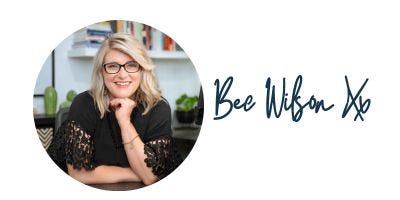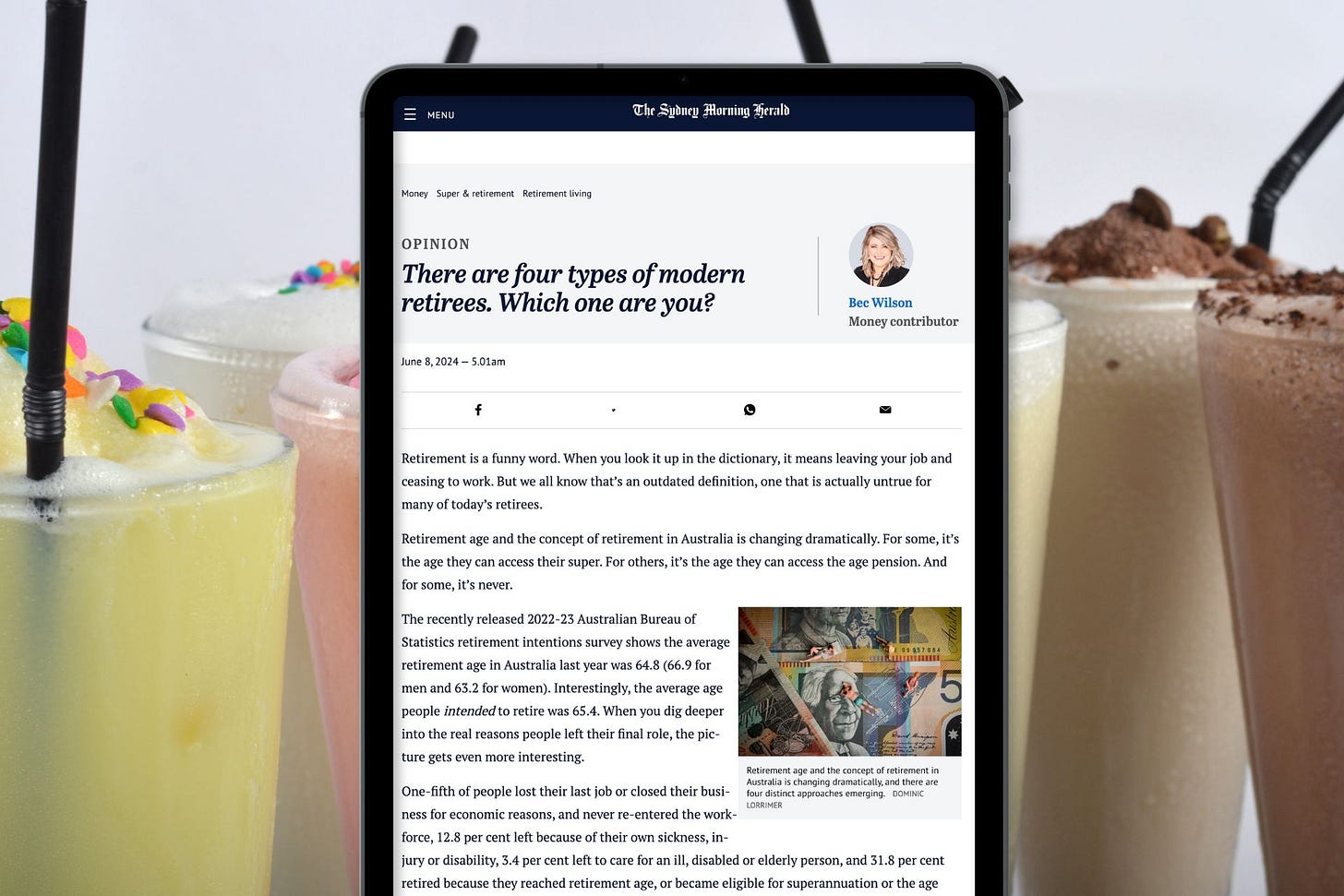There are four types of modern retirees. Which one are you?
And... letters! Is owning your own home really important in retirement?
In this edition
There’s just one massive newsletter each week now, so sit back and have a Sunday read!
Letters: Is owning your own home really important in retirement?
From Bec’s Desk: Without a hitch
In today’s Newspapers: There are four types of modern retirees. Which one are you?
Prime Time podcast: The nine golden rules of investment with Jamie Nemstas
First, our wonderful sponsor, Viking Cruises, has built a cool eguide for Primetimers and Epic Retirees who want to learn about river cruising. It’s got me tempted! Take a look…
Everything you need to know about river cruising
Imagine waking up in a new destination every day, feeling rested, refreshed and ready to explore. This is the beauty of a river voyage: like a floating hotel, your ship allows you to visit multiple countries with ease.
At Viking, our ships dock right in the heart of the grandest cities and quaintest towns, where our local guides will immerse you in enriching experiences that fascinate. Simply unpack once and let our dedicated crew take care of the rest.
To learn about life on the rivers, download our free guide that outlines everything you need to know about river cruising.
Hi Bec,
Thanks for your work! All the best retirement advice says you must own your own home. We want to sell our huge family house (mortgage fully paid off). We do not want to live in a house again and want the ease and ‘lock up and leave’ lifestyle of apartment living. However we do not want to buy an apartment as we don’t want to get involved in a strata title. In fact, during these discussions we have realised we don’t want the responsibility of owning at all and would love to just rent an apartment.
So our question is, what are the pros and cons of investing the $$$ and renting?
Thanks Lisa
Wow! Lisa! That’s a big can of worms. I’ll do my best in a short answer but on this, I URGE YOU to get advice. Your situation can differ wildly depending on YOUR assets and income sources.
As you can read in my book, and in other things I write, I see owning your own home outright as you head into retirement as a fundamental pillar that supports financial confidence and financial certainty. And I know not everyone has the benefit of owning outright, but that’s a different conversation. Here’s why I think it’s important:
It makes your housing costs predictable: Owning a home (with a paid-off mortgage) eliminates the risk of rent increases and provides a predictable housing cost in retirement. This can be particularly important for those on a fixed income - which, let’s face it, is most people
Housing investments can still appreciate: Historically, property values have appreciated over time, potentially increasing your net worth and providing a source of equity for emergencies or additional income.
There’s psychological security in owning your own home: For many, homeownership provides a sense of stability, security, and control over their living environment. This can be particularly valuable in later years.
You get to leverage the systems of retirement in Australia: Your principal place of residence is exempt from the assets test for the age pension in Australia. So, if you will be eligible to receive an age pension at any point and will be leaning on the assets test to do so, this is an important consideration as you can own a palace in Byron bay and potentially still get the age pension. If your income in retirement is what throws you out - it’s a totally different discussion.
You have a protected asset for future financial needs: And, if you need access to capital later in life, it can be an important tool, allowing you to downsize OR sell it to fund an aged care bond.
Now, my opinion is not necessarily right for everyone. You really need to think about your own situation and get advice.
It’s also important to point out that just because I think housing is an important pillar of financial certainty in older age, I am also very aware that this is not as straightforward a discussion as it once was. There's no denying that homeownership can offer some financial benefits, but it's not the only path to security. In fact, for some retirees, renting and investing, or renting, with a guaranteed income stream like a defined benefit pension or annuity can be an advantageous option.
Here’s the other side of the argument:
By selling a ‘HUGE’ house, you should unlock a significant amount of capital. Investing this wisely can generate passive income and potentially grow your wealth over time. Renting frees you from the financial burdens of rates, building insurance, and unexpected maintenance costs.
Renting gives you the flexibility to easily change your living situation. You can move closer to family, downsize if your needs change, or even try out different locations without being tied to a property.
Say goodbye to mowing lawns, fixing leaky roofs, and dealing with strata concerns. Renting allows you to enjoy a low-maintenance lifestyle, freeing up your time for travel, hobbies, and relaxation.
Investing your capital allows you to spread your risk across different asset classes. This may, if invested well, lead to higher returns and greater financial security compared to having all your wealth tied up in one property.
But there’s also a hefty list of cons…
You won't build equity in a property or have a tangible asset to pass on. For some, the emotional and psychological benefits of homeownership are important.
While you'll avoid unexpected maintenance costs, rent can increase over time, potentially impacting your budget. It's important to factor this into your long-term financial planning.
As a renter, you're subject to the landlord's rules and regulations. You may have less control over renovations, modifications, or even pet ownership.
Investments come with inherent risks. Market fluctuations can affect the value of your portfolio and your overall financial security. So, if you go down this path, please seek professional financial advice to develop a sound investment strategy.
Obviously, this discussion is tricky.
There’s one other type of housing people who want the benefits of renting but the long term stability of ownership might consider - and that’s land lease otherwise known as lifestyle communities. This type of living is particularly interesting to those who can access rent assistance which happens if you are eligible for the age pension - but many people who live in them do so without rent assistance,
Land lease and lifestyle communities offer an alternative option for retirees seeking a low-maintenance, community-oriented lifestyle without the burdens of traditional homeownership. You own the dwelling but lease the land, which can result in lower upfront costs and ongoing fees compared to buying a house or apartment outright. These communities often provide amenities like swimming pools, clubhouses, and organised activities, fostering social connections and a sense of belonging.
But, just like in all other property moves, and perhaps more so here, it's important to understand the terms of the lease agreement, potential annual compounding fee increases, and any restrictions on selling or bequeathing the property.
That WAS a big can of worms - hope I did it justice. Make it epic Lisa and please, get some advice.
Well! This week was not without eventful activities!
The Winter Edition of the How to Have an Epic Retirement Flagship Course is now underway - and it happened without a hitch! It’s so much fun to be inside the learning portal with hundreds of new students chatting away about their excitement and trepidation at the years ahead. Each week of the program, they get to attend live Q&As with some of Australia’s true technical leaders of retirement too, which I think adds a lot of opportunity to learn that simply isn’t available elsewhere. If you missed this one, the next program is our Spring Edition, launching in August - more here.
And, also this week just gone, the members of Care Super were treated to a 90 minute How to Have an Epic Retirement education session by their fund this week. A real thrill to present to hundreds of their members. Such a buzz when, after talking non-stop for an hour, the questions start rolling in thick and fast. Big thanks to the Care Super team for inviting me along for the event.
Next week is a busy one. I’m hopping down the east coast to present at the Association of Superannuation Funds Victorian Conference - presenting a case study of our retirement education! I’ll also be speaking in the offices of Colliers in Brisbane, Sydney and Melbourne to retirement housing developers about what retirees said they want and need more of in our recent housing survey (and I’ll share the insights with you very soon). It’s such a joy to be able to elevate the needs and wants of today’s modern retirees in the industries that support you.
Our podcast this week was super-interesting session with Jamie Nemstas, a premium financial adviser and the author of The Golden Years. He shared his nine golden rules of investment - which you can listen to wherever you get your pods.
And The Epic Retirement Club Facebook Group continues on strong! You just won’t believe how much it is growing peoples’ confidence to have other retirees to relate with.
Finally, don’t forget to send me your letters. I really want to help people with the big questions. And using your letters to guide my conversations can be super-fun.
Until next week… make it epic!
Many thanks! Bec Wilson
Author, podcast host, columnist, retirement educator, and guest speaker
There are four types of modern retirees. Which one are you?
This Article was first published in The Age, The Sydney Morning Herald, WA Today and the Brisbane Times.
Retirement is a funny word. When you look it up in the dictionary, it means leaving your job and ceasing to work. But we all know that’s an outdated definition, one that is actually untrue for many of today’s retirees.
Retirement age and the concept of retirement in Australia is changing dramatically. For some, it’s the age they can access their super. For others, it’s the age they can access the age pension. And for some, it’s never.
The recently released 2022-23 Australian Bureau of Statistics retirement intentions survey shows the average retirement age in Australia last year was 64.8 (66.9 for men and 63.2 for women). Interestingly, the average age people intended to retire was 65.4. When you dig deeper into the real reasons people left their final role, the picture gets even more interesting.
One-fifth of people lost their last job or closed their business for economic reasons, and never re-entered the workforce, 12.8 per cent left because of their own sickness, injury or disability, 3.4 per cent left to care for an ill, disabled or elderly person, and 31.8 per cent retired because they reached retirement age, or became eligible for superannuation or the age pension.
When you look at the sources of income people are dependent on in retirement, the real picture of what’s driving our retirement definition becomes even clearer.
In 2022-23, the age pension remains the single most important income source for most Australians in retirement. More people than ever before are retiring with a superannuation balance that will provide them with the ability to use it as a source of income, but the era of superannuation being the primary source of income for most retirees in Australia is still quite a long way off.
For each type of retiree, the opportunities and desires to work differ.
The latest data shows that 31.8 per cent of Australians are completely dependent on the age pension in retirement today and 17.6 per cent are partly self-funded, still drawing a part-pension. That’s at least 49.4 per cent of retired Australians relying on the pension for income. Alongside this, 37.1 per cent are fully self funded, a growing cohort.
The data shows that the number one factor influencing someone’s decision to retire is their financial security. No surprises there.
So the fact that IT, mining industry and financial services workers intend to retire earlier than nurses, administrative staff and agriculture workers again will be no surprise. Maybe the latter feel more passion for their jobs, but I suspect it’s the financial security that’s key.
When you get to know today’s retirees like I do, you see four distinct retirement definitions and each do retirement strategy completely differently:
Retirement age = superannuation age. These folks have healthy super balances and can afford to self-fund their early and middle retirement years (maybe even their later years too) without much help from the age pension. For these people the target window for retirement is often 60, the earliest age most can access their superannuation if they stop working.
Retirement age = age pension age. This group pairs a modest super balance with the age pension to create a passive income they can scrape by on without working full-time.
With the age pension qualification age at 67, this is the critical layer of income that enables them to give up full-time work and formally begin to access both the age pension and their superannuation.
Retirement? What retirement? These people love their jobs and don’t want to retire. They stay in the workforce longer and may choose to access their superannuation from the age of 65, without ever uttering the word “retirement”. Age is just a number to these people, and why shouldn’t it be?
The sweet spot strategists. This one is the person who is well-planned, understands how to use both superannuation and the age pension systems together. Having done their homework, they know they have enough superannuation to retire a couple of years before pension age.
You can read the rest of this article here in today’s The Age, and the Sydney Morning Herald today. It is not behind their paywall, but you may need to sign into their website to read it.
The nine golden rules of investment with Jamie Nemstas
Getting ready for retirement and wondering how to make your investments work harder? Today I’m talking with financial adviser, Jamie Nemstas, one of the two authors behind the book The Golden Years: How to plan a happy and secure retirement.
If you're nearing retirement, have capital to invest and are wondering how to make your money work as hard as you did, Jamie's got nine golden rules of investment he thinks everyone should know and understand. Buckle up for a ride through the do's, don'ts, and golden nuggets of retirement investing from a guy who does it for people with much larger super balances than average.
LISTEN HERE:











